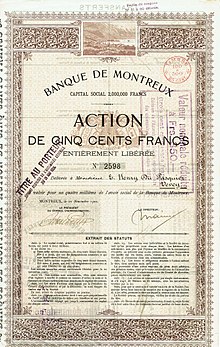Our website is made possible by displaying online advertisements to our visitors.
Please consider supporting us by disabling your ad blocker.
S.A. (corporation)
This article needs additional citations for verification. (December 2009) |
| This article is part of a series on |
| Corporate law |
|---|
 |

The abbreviation S.A. or SA[a] designates a type of limited company in certain countries, most of which have a Romance language as their official language and operate a derivative of the 1804, Napoleonic, civil law.[1] Originally, shareholders could be anonymous and collect dividends by surrendering coupons attached to their share certificates. Dividends were paid to whomever held the certificate. Since share certificates could be transferred privately, corporate management would not necessarily know who owned its shares – nor did anyone but the holders.
As with bearer bonds, anonymous unregistered share ownership and dividend collection enabled money laundering, tax evasion, and concealed business transactions in general, so governments passed laws to audit the practice. Nowadays, shareholders of S.A.s are not anonymous, though shares can still be held by a holding company to obscure the beneficiary.
Cite error: There are <ref group=lower-alpha> tags or {{efn}} templates on this page, but the references will not show without a {{reflist|group=lower-alpha}} template or {{notelist}} template (see the help page).
- ^ "Société Anonyme (S.A.): Definition, Examples, Requirements". Investopedia. Archived from the original on 2024-02-28. Retrieved 2024-02-28.
Previous Page Next Page


